#which are so so integral to conservation efforts
Text


This is just SO cool and so cute!!! Sheldrick Wildlife Trust, a wildlife & conservation organization, is celebrating their first "great-grand-baby" elephant! One of their many programs is raising orphan wildlife, primarily elephants. Their program has been going for over 5 decades! They discovered the right formula to sustain milk-dependent baby elephants, and I believe rhinos as well.
This year they've reached 52 calves born to ex-orphans in the wild, which is absolutely amazing. But now they have their first one born to one of THOSE calves, making ex-orphan Yatta a grandmother!
Here's the longer blog post with the stories for this amazing elephant family. This bit at the end made me cry -

@hope-for-the-planet this seems like your kind of post!!
#wildlife#wildlife conservation#elephants#wildlife rescue#conservation#i love following this organization#they have so many cool programs#including education and community support#which are so so integral to conservation efforts#this is just so cool for them
3K notes
·
View notes
Text
Nature Conservation
Male Crocodile Hybrid Yandere x Gender Neutral Reader
CW: Noncon, no pain, stalking, kidnapping, oviposition, non-human genitals, big slimy reptile dick, fucked senseless, general yandere behavior
Word Count: 550
(Y'all voted for crocodile man so y'all get crocodile man! Not beta read. Please forgive any mistakes.)
Wreck, the crocodile man, was massive. Large even for his species he was over 7ft. tall, and all muscle.
His entire body was covered in thick scales, his fingers clawed and his back studded with sharp ridges.
And his long slimy cock, normally tucked away in his genital slit, was currently pounding away relentlessly into your shaking body.
Drool seeping from the corner of your mouth as you made a symphony of pleasured noises.
Wreck couldn't be happier. Your tight warmth felt just perfect around his large reptilian cock. You were made for him, he was convinced of it.
When he first saw you he was intrigued and watched you intently. You were a conservationist working to preserve the mangrove habitat that he called home.
Most humans he had to scare off, they came here drunk and got garbage everywhere. But not you. You did the opposite.
But you weren't stupid, you came with a group that you led to stay safe. Dangers lurked in these waters.
You noticed the croc man watching you and feared he may be hunting you. Which was true. He was hunting you. But not for a meal.
It took him a while to coax you into letting him get close to you. But Wreck was persistent.
It started by shouting conversations and curiously asking you questions followed by gratitude for your efforts to clean the environment. Soon he could sit by you and share food with you.
Wreck figured if he brought you some cooked food it would subconsciously make you aware that he was a capable provider. And it would also put you at ease because you could see he wasn't hungry and even had food to spare. So you would know he had no interest in harming a human for a meal.
He integrated himself into your group and helped you all gather garbage. He even posed for photographs that would be used to promote the work the group was doing.
Finally he got you alone. He clasped your mouth shut and dragged you into the water, swimming away with you to his cozy little cave before anyone noticed your absence.
Wreck wasted no time at all in removing your bothersome clothing and sliding his tapered dick right into you. It was so slimy that you didn't need any preparation and there was no pain, just a sudden fullness.
It had all happened so fast that you were stunned by confusion. One moment you were sitting at the water's edge beside Wreck and the next thing you knew you were being bred.
He put one of his hands at your hips and the other on your chest, claws raking carefully against your flesh but not breaking the skin.
You whimpered loudly as he fucked into you, and began moving back against him, desperate to have him even deeper.
His large body molded around yours as you both came hard.
You were panting, starting to realize what had just happened when, much to your surprise, the cock in you deposited a large egg inside you.
The day had started with dreams of cleaning up the environment for the animals and your crocodile friend. And now you were the environment for a crocodile egg.
And if Wreck had his way then this certainly wouldn't be the last one.
#yandere teratophilia#yandere terato#Yandere#Yandere monster man#Yandere x reader#male yandere x gn reader#Gender neutral reader#Monster boyfriend#yandere boyfriend#monster x reader#My OCs#My OC Wreck
6K notes
·
View notes
Text
Interior Department Announces New Guidance to Honor and Elevate Hawaiian Language

"In commemoration of Mahina ʻŌlelo Hawaiʻi, or Hawaiian Language Month, and in recognition of its unique relationship with the Native Hawaiian Community, the Department of the Interior today announced new guidance on the use of the Hawaiian language.
A comprehensive new Departmental Manual chapter underscores the Department’s commitment to further integrating Indigenous Knowledge and cultural practices into conservation stewardship.
“Prioritizing the preservation of the Hawaiian language and culture and elevating Indigenous Knowledge is central to the Biden-Harris administration's work to meet the unique needs of the Native Hawaiian Community,” said Secretary Deb Haaland. “As we deploy historic resources to Hawaiʻi from President Biden’s Investing in America agenda, the Interior Department is committed to ensuring our internal policies and communications use accurate language and data."
Department bureaus and offices that engage in communication with the Native Hawaiian Community or produce documentation addressing places, resources, actions or interests in Hawaiʻi will use the new guidance on ‘ōlelo Hawaiʻi (Hawaiian language) for various identifications and references, including flora and fauna, cultural sites, geographic place names, and government units within the state. The guidance recognizes the evolving nature of ‘ōlelo Hawaiʻi and acknowledges the absence of a single authoritative source. While the Hawaiian Dictionary (Pukui & Elbert 2003) is designated as the baseline standard for non-geographic words and place names, Department bureaus and offices are encouraged to consult other standard works, as well as the Board on Geographic Names database.
Developed collaboratively and informed by ʻōlelo Hawaiʻi practitioners, instructors and advocates, the new guidance emerged from virtual consultation sessions and public comment in 2023 with the Native Hawaiian Community.
The new guidance aligns with the Biden-Harris administration’s commitment to strengthening relationships with the Native Hawaiian Community through efforts such as the Kapapahuliau Climate Resilience Program and Hawaiian Forest Bird Keystone Initiative. During her trip to Hawaiʻi in June, Secretary Haaland emphasized recognizing and including Indigenous Knowledge, promoting co-stewardship, protecting sacred sites, and recommitting to meaningful and robust consultation with the Native Hawaiian Community."
-via US Department of the Interior press release, February 1, 2024
--
Note: I'm an editor so I have no idea whether this comes off like as big a deal as it potentially is. But it is potentially going to establish and massively accelerate the adoption of correctly written Native Hawaiian language, as determined by Native Hawaiians.
Basically US government communications, documentations, and "style guides" (sets of rules to follow about how to write/format/publish something, etc.) can be incredibly influential, especially for topics where there isn't much other official guidance. This rule means that all government documents that mention Hawai'i, places in Hawai'i, Hawaiian plants and animals, etc. will have to be written the way Native Hawaiians say it should be written, and the correct way of writing Hawaiian conveys a lot more information about how the words are pronounced, too, which could spread correct pronunciations more widely.
It also means that, as far as the US government is concerned, this is The Correct Way to Write the Hawaiian Language. Which, as an editor who just read the guidance document, is super important. That's because you need the 'okina (' in words) and kahakō in order to tell apart sizeable sets of different words, because Hawaiian uses so many fewer consonants, they need more of other types of different sounds.
And the US government official policy on how to write Hawaiian is exactly what editors, publishers, newspapers, and magazines are going to look at, sooner or later, because it's what style guides are looking at. Style guides are the official various sets of rules that books/publications follow; they're also incredibly detailed - the one used for almost all book publishing, for example, the Chicago Manual of Style (CMoS), is over a thousand pages long.
One of the things that CMoS does is tell you the basic rules of and what specialist further sources they think you should use for writing different languages. They have a whole chapter dedicated to this. It's not that impressive on non-European languages yet, but we're due for a new edition (the 18th) of CMoS in the next oh two to four years, probably? Actually numbering wise they'd be due for one this year, except presumably they would've announced it by now if that was the case.
I'm expecting one of the biggest revisions to the 18th edition to add much more comprehensive guidance on non-Western languages. Considering how far we've come since 2017, when the last one was released, I'll be judging the shit out of them if they do otherwise. (And CMoS actually keep with the times decently enough.)
Which means, as long as there's at least a year or two for these new rules/spellings/orthographies to establish themselves before the next edition comes out, it's likely that just about every (legit) publisher will start using the new rules/spellings/orthographies.
And of course, it would expand much further from there.
#don't ask me about the magazine and newspaper half of this#bc I do Not know AP style#except the differences I'm annoyed at lol#ap doesn't respect the oxford comma#hawaii#hawaiʻi#language#orthography#linguistics#language stuff#hawaiian#native hawaiian#united states#publishing#book publishing#indigenous#indigineous people#indigenous languages#language revitalization#language resources#editorial
407 notes
·
View notes
Text
Yandere! Stereotypical! Emo x Stereotypical! Popular bitch! Reader
Okay, so this is a songfic... NSFW at it's most, a lime at it's least.
Not the songfic that has lyrics on them, but fics that are heavily inspired by songs. And this time, it's Emo Boy by Ayesha Erotica.
I'm not that knowledgable with Emos to be fair... I'm only doing it in a way where the fic reads like a stereotypical late 90's and early 20's teen flick! I think. I hope.
Also, the bitch here means someone who sleeps around quite a lot, and not the mean type. Just wanna put that out there.
So, I do apologize if I offended someone ಥ‿ಥ
Like any song fic, I recommend listening to Emo Boy while reading.
Yandere! Emo name: Ashton
TW: stereotypical Emo, stereotypical popular bitch

Ashton always had a fascination with the Emo lifestyle. He loved the music associated with it, especially the people indulging in the lifestyle. He loved how emotional and in tune they are with their emotions and is not afraid to show who they are.
When the got the opportunity to study senior high school in a small yet lively town, he knew he had to grab it.
And when he finally got out of the grasps of his conservative family, he felt free.
No more people calling him demon worshipper, finally (although, now that he thinks about it, aren't the goths the one being called demon worshippers?)
So with black skinny jeans, long, dark black hair that covered his eyes, rings, piercings, chains, sneakers, and a graphic tee shirt, he knew he was ready.
But what he didn't expect was being ostracized by being Emo.
But then, don't people like him always get bullied?
With a grumble while sitting on his chair, all alone, he gripped his pen while in the middle of writing a poem.
"Nobody understands me." Ashton muttered, his dark eyes a stormy grey.
This school he's in is filled with stereotypes, he just realized. Mean Jocks and Cheerleaders, two faced popular bitches, pushover nerds, slobbery otakus, social outcasts... He wonders if his life is a real life teen flick.
So rather than dive into the complicated social hierarchy, he just sits in his seat, reading and listening to MCR and P!ATD just like a true stereotype.
His life filled with such deep melancholy as he trudged in this hormone filled prison that he calls a school.
Hmm. He should write that in his journal.
But then he woke up in his bedroom, his hair having a cowlick he can't put down.
Okay... That's weird.
Then, when he tried to tease and straighten his hair, it won't budge, forcing him to let it stay wavy/curly and covet his eyes just like that.
Then, his favorite graphic tee was eaten by rats...
And his sneakers were accidentally bleached...
Then, as if the day was mocking him, it was really sunny and hot, smiling and cooking him in his dark ensemble.
"What the fuck..."
He suddenly felt a foreboding dread inside of him.
When he got in the school and sat down at his seat at the back, he heard whispers of a new person transferring to this school.
The talk of the town, y/n, was now being speculated which clique they will belong in.
And when they rolled in a pink rover, the school crowd knew they're going to be in the popular rich kids.
Immediately, you integrated into the clique like it was a natural thing to do.
With your quite the revealing clothes, your bimbo/himbo like personality, and your knack for bedding people if you wanted, you got into the social hierarchy just like that. Labeled as the slut, you paraded around the school with that title with your newfound friends.
Trendy, social, quite the airhead, yet charming in your own right, and such a seductive figure too. Nobody can resist your charms.
Not even Ashton.
He tried to fight back the attraction he had with you, and your fashionable pink fit, and fluttery eyelashes.
But he can't.
The hierarchy said no, and his brain also says no.
Yet his heart sings yes.
And he always follows his feelings and his heart.
It was small efforts at first. Poems, love letters filled with such romantic words.
All slipped in your locker, in a cute pink envelop and a sweet sampaguita smell on it.
You knew who it was from, and you loved it.

"Are you really interested in that Emo boy in the HUMSS department?" One of your friends asked, sipping on a disguised flask of alcohol.
You and your friends are in the rooftop, hanging out and skipping classes. Gossip flies out of your mouths and recent "relationships."
"Yeah I am. He's cute and funny... And him being soooo in touch with his emotions is soooo hot." You said, a typical valley accent on your tone.
You twirled your hair and bit your lip, a hot feeling in your body.
You really don't know why you're so attracted to him.
"I just really want to see and feel how good in bed he is." You nonchalantly added, fanning yourself a bit.
Your other friends grimaced a bit.
"... Really? But he's so..."
"Dark."
"Weird."
"And so complicated with his words."
"He's also always alone and listens to those sad emo bands."
You huffed and cocked your hips to the side.
"Hey! He's emotional and deep!" You rolled your eyes. "Besides, I just want to fuck him. I mean, I haven't been with an emo boy."
You thought back to how Ashton walks away from you in those tightest skinny jeans, his ass round and his legs toned.
You wondered really as to why you're so... Desperate to fuck him. Because most of the time, other people are the ones who want to fuck you.
Frustration welled up inside you as you groaned.
"Yeah I truly wonder why myself." You grumbled.
You grabbed the letter from your back pocket, reading Ashton's poem for you.
I burn for you.
Your lips so tantalizing,
So pillowy and so sacred.
It's something I, so lowly am I,
Cannot dream of locking with mine.
I do not need to know if you're the devil,
Tantalizing as you are,
Or the deity you claim to be in my dreams,
Bringing retribution to my dark and dreary life.
Your body so tempting,
I want to embrace and bury myself within you.
I want to claim and mark you as my own,
My bleeding heart corrupting your alluring self.
But I know I can't.
So I only look at you with starry eyes,
As you shine the most beautiful in a pedestal that I molded in your visage.
You understood the poem a bit, and it irritated you.
"What do you mean you'll not pursue me?!" You yelled, gripping the letter. "I can't believe he'll confess like this and not... Go for me?!"
Your friends chuckled and read the poem and was surprised to see how whimsical this confession of lusty attraction is.
"Wow... Okay, I give you my blessing to bed him." One of your friends said and you rolled your eyes and snatching the poem away from him.
"I know. And I'm trying." You spat out. "I need a stress reliever. Let's go shopping."
What you didn't know is that Ashton is listening to your confession, and is fighting the urge to take you then and there.
He smirked and tried to calm his fast beating heart as he slowly unbuckled his pants, lust filling him as he continued to replay your confession of wanting to fuck him.
Maybe next poem will be an invitation to his house.

The sound of bed creaking filled the dark room, along with the pants and moans of two people indulging in the desire of flesh.
"Hmm fuck... Ashton..."
"Y/n you're so tight..."
You moaned as Ashton continued to thrust inside of you, his throat audibly clearing as sweat trickled down his throat.
Your eyes trailed down his body, loving the feeling of being under this man.
The hot and damp air encased the two of you, giving a secure and secret paradise, away from the prying eyes.
"Harder Ashton!" Your raspy voice demanded, gripping his arm as he pushed your thighs to the sides of your torso, bending your back as he went deeper, faster, and harder.
"God you make me feral..." Ashton groaned out, feeling your walls squeeze around him stubbornly, not wanting to let go as he pushed you into a mating press in an animalistic need to bury himself deep within you.
The bed creaked violently, accompanying the orchestra of your moans and groans as you both desperately reached your high, and when he spilled inside of you, you knew that you wanted more.
So you kissed him on the lips deeply, interlocking your tongue with his as you both worked into getting into it again.
Yet, as Ashton smirked and gripped your thigh once more, ready to go, a stray perfume bottle rolled under the bed from the movement, a label on the bottle printed "love potion" on it.
A sweet smell of sampaguita permeating as a drop fell on the floor, glowing.

So if you don't get it, Ashton sprays the love potion on the poems he gives you, making you irrationally desperate for him as he is for you xx.
#yandere boyfriend#yandere imagines#yandere male#yandere writing#male yandere x reader#tw yandere#yandere x darling#yandere x you#yandere fic#yandere drabbles#lizzaneiaelizalde
516 notes
·
View notes
Text
Y'all want postcards from my visit to Twitter? Full disclosure all of these people are Nazis so be aware that I mock them without the slightest minuscule grain of good humor

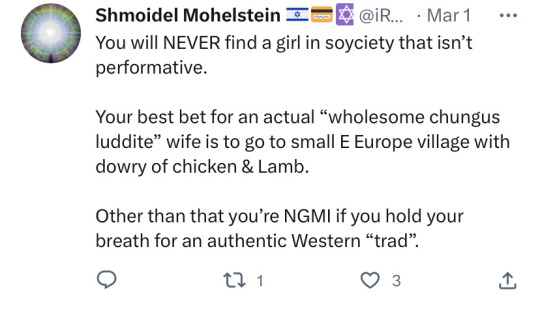
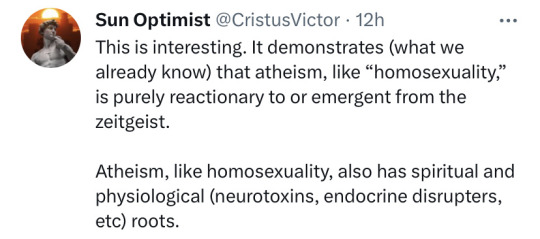


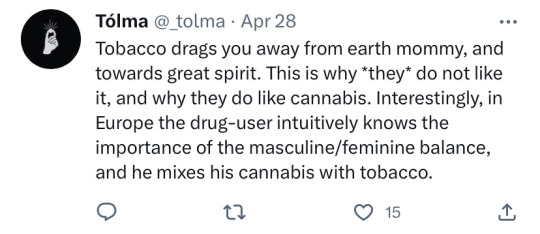

Normal things to type with your hands huh
Anyway I'm hit so hard these days by how contemporary fascism shares like 90% DNA with Conservative Evangelicalism.
And that's really what frustrates and frightens me about contemporary Christianity, because there are people in it whose political beliefs uncertainly approach "liberal," who want to grapple with racism and sexism in the Church, but a lot of the writers and thinkers that were foundational to their worldview are now viewed by them as good-naturedly misguided, when their ideas were Very Much Fascism. Being a philosopher or theologian with a mild mannered affect doesn't make them not a fascist. Being well-intentioned in a twisted way doesn't make them not a fascist. Failing to realize that what they were supporting and proposing is fascism doesn't make them not a fascist.
There is just not a sufficient recognition of the horrible seriousness of the "culture war" and how the topics that were battlegrounds in the "culture war" were selected for monstrous political purposes.
There is a continued effort to "save" or "salvage" things like being pro-life and supporting abstinence until marriage, and this, to me, reflects a continued failure to seize the fascist abomination Evangelicalism has become and truly tear it up by the roots. Can you be personally uncomfortable with abortion or personally in favor of sex within a committed relationship? Of course. But these things would not be political issues without the influence of fascism in culture and politics. They would not occupy your head like this. They would not be the main subjects of your moral universe without the consuming sense of anxiety that your society is increasingly descending into moral degeneracy, partly to the increased visibility and dominance of groups that are culturally "other," posing an existential threat to the integrity and stability of your culture—which is an INTEGRAL CHARACTERISTIC OF FASCISM
It's at the point where exchanging ideas with conservative Christians, as a more progressive Christian, drags you down more than it could ever lift them up. It's like you're trying to carry a backpack attached to a chain and the other end of the chain is attached to a rabid wolf.
It doesn't matter how important the stuff in the backpack is to you. You cannot go back for it. And if your buddy insists on going no further unless the backpack can come with you, you'll have to make a decision, because that wolf's eyes are lit up with sightless sickly fire and his jaws are foaming and snapping.
763 notes
·
View notes
Text
Israeli settlements embody urbanization and the immense harm it poses. First, Israeli settlements are almost entirely built on confiscated Palestinian agricultural or grazing lands and are only erected after clear-cutting and uprooting local flora, namely olive trees: a primary source of food and income for Palestinians. The olive tree is also and an integral element of Palestinian identity, dating back millennia and symbolizing peace, steadfastness, fortitude, and resilience. As of 2015, the olive sub-sector constituted 15% of Palestine’s total agricultural income, supported over 100,000 Palestinian families, and provided “3 to 4 million days of seasonal employment per year”. Not only are Palestinian olive trees clear-cut to construct Israel’s illegal settlements, but according to the United Nations, are also “subject to fire, uprooting and vandalism by settlers”. Conservative estimates taken in 2011—after which Israel has only intensified its colonial efforts—revealed that nearly 1 million Palestinian olive trees have been uprooted and destroyed in a settler-colonial attempt to erase all traces of Palestinian heritage, culture, and existence.
According to a 2020 United Nations Environment Programme (UNEP) report, the destruction of Palestinian olive trees — a cog in the greater, well-oiled Israeli mechanism of ethnic cleansing — coupled with the strategic expansion of illegal Israeli settlements, has devastated terrestrial ecosystems, causing severe “habitat fragmentation, desertification, land degradations, rapid urbanization, and soil erosion”. The UNEP went on to state that the process of urbanization through the “removal of rocks for construction, the uprooting of trees, invasive species [most often imported by the Israeli government and settlers to ‘Europeanize’ the land], [and] pollution…[is] threatening habitats and species.” The cruel, discriminatory measures Israel imposes upon Palestinians has led, among other issues, to a drastic decrease in agricultural productivity—and hence economic growth and stability—across Palestine.
The effect of urbanization on local fauna is equally frightening. The previously diverse Palestinian fauna is under imminent threat. Israel’s construction of roads, the methods used to do so, and a sheer disregard for their ecological ramifications all threaten and harm Palestinian wildlife. Israeli forces often drill deep into mountains—inhabited by a wide range of natural fauna—thereby both displacing local wildlife populations, inhibiting their natural migrations, and resulting in a spike in animal deaths through roadkill. Furthermore, the destruction of the animals’ natural habitat—particularly their breeding and nesting sites—through “extensive land leveling and the fencing-off of settlement perimeters” has disrupted natural passageways, endangered many species, and caused severe imbalances in their population number and reproduction rates, affecting the food chain and local ecosystem as a whole.
132 notes
·
View notes
Text
By Miles Parks
NPR
June 7, 2023
Why are Republicans abandoning one of the best tools the government has to catch voter fraud? That simple question is the focus of a new NPR investigation, published Sunday.
The tool is the Electronic Registration Information Center, better known as ERIC. It was created almost a decade ago as a way for states to share government data, in an effort to keep their voter rolls up to date. It allows election officials better insight into when their voters move and die and the rare times when they vote twice in different states, which is illegal.
"The little secret is that maybe more than 10 years ago, if somebody voted in Ohio, in Florida, in Arizona and Texas, you would have never known," Ohio Secretary of State Frank LaRose, a Republican, said in an interview with NPR in February. "With ERIC, we can compare our voter rolls to those states."
Eight Republican states have now pulled out of ERIC, including many with voting officials who are on the record as praising the partnership as recently as a few months ago. Ohio pulled out a month after LaRose spoke to NPR.
J. Christian Adams, a conservative elections attorney, has long been a critic of how ERIC operates. But he told NPR: "It's this crazy zeal to get out of ERIC ... that is going to cause voter fraud to flourish."
So what happened? Here are five takeaways from NPR's investigation:
1. A far-right website kicked things off
The story starts in January 2022, when a far-right website called the Gateway Pundit, which has pushed conspiracy theories in the past, began writing about ERIC. Up until then, the partnership was considered a quiet bipartisan success story, with member states that spanned the political spectrum.
NPR's investigations team analyzed hundreds of thousands of social media posts on a handful of social media sites frequented by election deniers. We found the Gateway Pundit's coverage started the far right's fixation on the program:
See Chart.
Roughly a week after the first Gateway Pundit article, Louisiana Secretary of State Kyle Ardoin, a Republican, announced his state would become the first to pull out of ERIC, citing "concerns raised by citizens, government watchdog organizations and media reports."
2. Local "election integrity" groups are a political force
NPR found that while Ardoin did not make a big public show out of pulling out of ERIC, he did bring the announcement to maybe the only constituents at that time who would even care: a local group of conservative activists gathered in Houma, La.
The crowd, assembled for an "election integrity town hall," applauded for 15 seconds when Ardoin announced he was pulling the state out of ERIC. The event was publicized less than 24 hours before Ardoin's office released its statement on ERIC.
NPR's investigation also found these sorts of community election integrity groups to be critical in the effort to discredit ERIC across the country.
A group called Protect Your Vote Florida published a page on its website called "How to Influence Florida Legislators to Suspend Contract with ERIC!"
"The STRATEGY is to run a campaign directed at key Florida legislators," the group wrote in the post, which included a list of the state's lawmakers and contact information. "Hand delivered letters, emails, phone calls, and social media activity will all be utilized to maximize impact."
Emails acquired by NPR through public records requests showed election officials began to field questions from voters and state lawmakers shortly after these calls went out.
3. A Trump ally has coordinated an election denial machine
Cleta Mitchell is known by many for working with former President Donald Trump to try to overturn the 2020 election. The attorney was on the infamous call where Trump asked Georgia election officials to "find votes."
In the time since, she's been building an election denial infrastructure.
Her podcast, "Who's Counting," has become a central hub for stolen election narratives, and she's also started a coalition of grassroots groups across the country called the Election Integrity Network.
NPR's investigation found Mitchell to be a ringleader of sorts for the effort to dismantle ERIC.
She even hosted a secret ERIC summit with red state lawmakers last summer, according to documents shared with NPR by a nonprofit watchdog group called Documented.
Secretaries of state from the first five states to withdraw from ERIC attended the event, according to one attendee.
See chart.
4. Republican primaries are a driving force behind the ERIC exodus
In Louisiana, when Ardoin made the decision to leave ERIC, he was gearing up to run for reelection in a state Trump won by almost 20 percentage points. He was facing numerous challenges on his right. And ERIC was becoming a priority for Republican voters.
"We started hearing it on the campaign trail," added Alabama Secretary of State Wes Allen in an interview with NPR.
Allen ran for his office last year, and shortly after the Gateway Pundit published its first article, he made a campaign promise to pull out of ERIC if he won. This January, he followed through, and Alabama became the second state to withdraw.
Secretaries of state in Missouri, West Virginia and Ohio — all states that have pulled out — have announced campaigns for higher office next year, or are expected to run.
In Florida, Gov. Ron DeSantis is a candidate for the 2024 Republican presidential nomination. DeSantis appointed Cord Byrd as his secretary of state last year, and the state's stance on ERIC shifted almost immediately.
NPR's investigation found that before he was secretary, Byrd regularly joined election integrity calls hosted by Mitchell.
5. ERIC withdrawals will make for "dirtier voter rolls" and an emboldened far right
Georgia Secretary of State Brad Raffensperger, a Republican, put it simply in an interview with NPR: The states that have left ERIC "indirectly said, 'We're going to have dirtier voter rolls.' "
Brianna Lennon, a Democrat who oversees voting in Boone County, Mo., told NPR that will surely be the case in her county.
Before Missouri joined ERIC, the elections office relied on returned mail to find out if a voter moved to another state.
"That's what we'll have to go back to using," she said.
Election experts say less accurate voter rolls have a direct impact on voters, from longer lines at precincts to mail ballots and information getting sent to the wrong places.
Lennon told NPR she's worried about what the ERIC saga means for the 2024 election cycle. She had gotten a sense recently that community election integrity groups were gaining more traction in her state, but she says the secretary of state's decision was the first major policy decision she's seen that lined up so directly with their goals.
"I'm sure there are going to be ripples that come from this particular move and I'm not exactly sure what the end will be," she said. "I don't think this is an isolated thing."
Read or listen to the full investigation here.
191 notes
·
View notes
Text
In October 2022, when Giorgia Meloni became Italy’s prime minister, concerns arose about her democratic credentials. Since her youth, Meloni had been associated with far-right movements, initially with the Italian Social Movement (Movimento Sociale Italiano1) and eventually with the Brothers of Italy (Fratelli d’Italia), which were ambiguous about the fascist regime that had suppressed democracy between the two world wars. Only three months before winning the elections, she had advocated for a political stance that seemed not aligned with the other liberal democratic parties in Europe. In a public speech in Barcelona, she summarized her agenda vividly: “Yes to the natural family, no to the LGBT lobby, yes to sexual identity, no to gender ideology … no to Islamist violence, yes to secure borders, no to mass migration … no to big international finance … no to the bureaucrats of Brussels!”
Those words, and especially her branding of the European institutions as a barely legitimate bureaucratic clique, might have been pronounced by Hungarian Prime Minister Viktor Orbán, who is known as the standard bearer of “illiberal democracies,” new nationalists, and friends of autocrats such as Russian President Vladimir Putin. This affinity has fueled concerns that Meloni’s leadership of the third most populous country in the European Union would undermine efforts to achieve greater political integration within it, bring back nationalism in the heart of Europe, and increase the influence of autocratic regimes in the West. In such a case, Meloni might have become the crucial link in a chain reaction spreading autocracy worldwide.
This raised the question: would Meloni become a new autocratic leader in the heart of Europe or rather a mainstream conservative politician? To answer it, her actions have been scrutinized on three counts. Firstly, would Meloni uphold the rule of law while managing consensus within the country? Secondly, since consensus was also dependent on the state of the economy, would she tackle the Italian economy’s traditional weaknesses by adopting politically costly reforms? Finally, considering the close ties between the Italian and European economies, would Meloni pursue her nationalist goals while also forging strong alliances in Europe in order to play a leading role in a challenging global context?
Almost two years into Meloni’s term, this sequence of questions (consensus-economy-Europe) is starting to get some answers. In short, Meloni’s primary political objective has been to establish her party’s influence in Italy’s public administration and cultural sector, aiming to promote a right-wing narrative of the nation and paving the way for the continuation of her leadership in future legislatures. Meloni portrayed this endeavor as a way to stabilize Italy’s political system and, as a direct result, let the economy benefit from a stable legislative framework. Ultimately, she hoped the resulting stronger economy would restore Italy’s credibility in Europe and in the international community.
Critics from the opposition describe this sequence differently. They argue that Meloni is pushing the Italian political system toward an “autocracy-light” model and that her government has made no significant contributions to stabilizing the economy, which is being sustained primarily by European subsidies. Finally, her international strategy’s shortcomings and ambiguities are isolating Italy from the other liberal democracies and drawing it closer to autocratic regimes.
In the following sections, this paper presents an assessment of Meloni’s government following the chain described so far: building consensus within Italy, managing Italy’s economic weaknesses, and forming European alliances. In this regard, three key factors stand out. First, Meloni’s agenda of institutional reforms aims to boost the prime minister’s authority, concentrating more power (and potentially consensus) in her hands while diminishing the role of parliament. Second, the Italian economy is expected to experience reduced fiscal support from Europe, thereby returning to lower growth rates after 2025. Lastly, recent events in European politics have shown that Meloni has become isolated from Europe’s decisionmakers. This isolation may weaken her hopes of becoming a central figure in the conservative shift that has characterized global politics, particularly in the case of a conservative victory in the 2024 U.S. presidential elections.
In the coming months, Italy’s complex political framework may force Meloni to decide whether to become a European centrist stateswoman or return to her nationalist convictions. This paper suggests that Meloni should turn her sequence of priorities (consensus-economy-Europe) upside down. Starting from a new constructive European strategy, followed by economic liberalization, and finally coming to obtain domestic consensus through her concrete achievements.
1. Consensus: Concentrating power in the hands of the prime minister
Meloni became part of the Youth Front (Fronte della Gioventù) the youth organization of the far-right party Italian Social Movement (MSI), in 1992. MSI was established in 1946 by former members of the National Fascist Party and exponents of Benito Mussolini’s regime. The party later evolved into MSI-Destra Nazionale and in 1994 changed its name to the National Alliance (Alleanza Nazionale, AN). AN represented a break with the nostalgic past, positioned itself as a post-fascist party that disavowed fascism, and aimed to align with the European People’s Party, the main centrist group in Europe. However, resistance to the party’s shift toward centrism led to the collapse of AN and the foundation of Brothers of Italy (FDI) in 2012. Since 2014, Meloni has served as FDI’s president, and she has claimed continuity with the ideologies of MSI and AN, whose names and symbols, including the flame allegedly burning on Mussolini’s thumb, are still part of FDI’s emblem.
Due to the close connection between MSI’s and FDI’s personnel, the latter’s culture still clings to a distorted and nostalgic narrative of Italy’s fascist regime under dictator Mussolini (1922-1943). Hence, when Meloni was appointed, she was labeled as the first post-fascist prime minister of the Italian Republic. There were also concerns that she might become a “pre-fascist” leader by exploiting domestic problems and the threatening international context to centralize power, lock in consensus, and modify the democratic constitution approved in 1947 (when only the heirs of Mussolini’s fascist party voted against it) to gain autocratic power.
Italy’s far-right leaders had often maintained ambiguity about their agenda. Throughout its history, MSI had alternated between moderate political stances and revolutionary temptations. In a speech at the Central Committee in 1969, Giorgio Almirante, one of MSI’s cofounders and its leader until 1987, described the movement as a “non-totalitarian party, though it considers the State as diverse and superior to the party, non-nostalgic but modernist, non-nationalist but pro-European, not conservative-reactionary but socially-advanced.” At the same time, however, Almirante used to say that Italy’s right could not aim at being a normal conservative party because there was nothing to conserve in Italy. Fringes within the MSI, which saw Almirante as their reference point,2 were involved in terrorism and subversive activities. The far right’s revolutionary character was one of the reasons why the generations that grew under the MSI’s influence have been regarded as not reliably democratic.
Even after becoming prime minister, Meloni still avoided directly and unconditionally condemning fascism, unlike her predecessor, AN leader Gianfranco Fini, who labeled fascism as “the absolute evil.” However, recognizing herself in the values of the Italian Constitution, Meloni has de facto disavowed the revolutionary temptations of many of her fellows in the MSI youth organization.3 Meloni is different from some of FDI’s older members, who are still inclined to fascist nostalgia; she represents a generation of far-right leaders whose political roots can be primarily traced to the violent antagonism between far-right and far-left youth organizations after the 1970s.
For generational reasons, her political background could thus preeminently be defined as anti-left. She is now expected to complete the transformation of the revolutionary movement of her youth into a “national-conservative party.” This would require a root-and-branch elaboration of a new party program. Meloni is struggling to do this, probably because her nearly uninterrupted role in the opposition has entrenched a culture of counter-positioning rather than pro-positioning. For the time being, the foundation of a new conservative political proposal—that would likely take Meloni’s party closer to the European People’s Party—is not progressing.
Meloni’s ambiguity, however, should not be seen as a sign of a possible return to the neo-fascist revolutionary path. Fascism is a historical phenomenon characterized by the use of violence to conquer and maintain power at the expense of democratic institutions. But most modern far-right parties claim to reject the use of violence and likening them to their fascist predecessors can be misleading. More importantly, nearly 102 years after Mussolini’s “March on Rome,” the conditions of Italian society are very different from those that existed before fascism. Political violence is at historical lows. Most citizens are unwilling to relinquish the individual freedoms that have contributed to their well-being since World War II. They want to be free to wander and work around the world, without being constrained by oppressive nationalism. Poorly educated or discredited politicians chanting the greatness of an Italian atavist heritage generally sound risible. And although poverty has increased in the last two decades, most households’ accumulated wealth (Figure 1)—even in the last two decades when growth was stagnant—empowers citizens to shape their destinies and those of their children, irrespective of the governing authority. That said, Italy’s private wealth is partly a matter of “monetary illusion” (in other words, mistaking nominal value for previous purchasing power) because its real value is no longer increasing. Moreover, over the last 15 years, the wealth of Italian households has significantly declined in comparison to other larger European economies. In 2011, the average wealth of Italian families was 75% higher than that of German families, but 12 years later, it was lower. Factors such as low income growth, a steady increase in public debt, and the relative decline of wealth keep undermining citizens’ trust in public life.
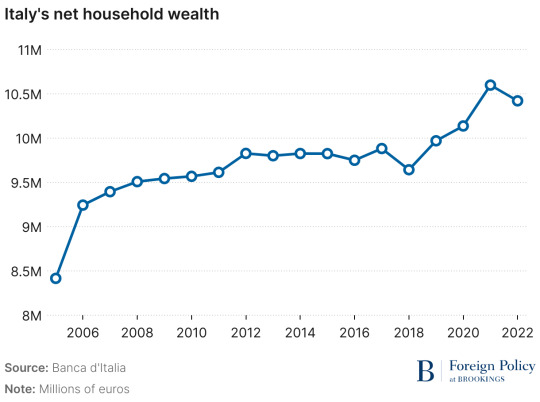
In a society defined by wobbly trust levels, consensus is manufactured through emotional appeals that are fueled by victimhood, revanchism, hostility toward strangers, and ideological solidarity with “indigenous” people. Meloni’s emotional and direct personality has become central to this narrative. Her rhetorical and facial expressivity, at the same time ironic and consoling, make her an archetypal theatrical figure—the shrewd commoner in an Armani suit—that her country fellows seem to appreciate in the context of Italy’s 24/7 political comedy. According to the data collected by Ipsos and published by Corriere della Sera, an Italian newspaper (Fig 2), Meloni’s level of support among the citizens has been declining from 58% to about 44% but remains comparatively solid.
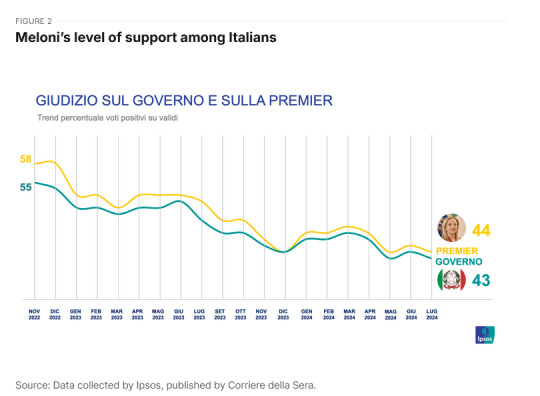
Controlling the all-important public television networks, the government parties (a populist-conservative coalition of three parties: Meloni’s Brothers of Italy, Matteo Salvini’s Lega, and Forza Italia, founded by former Prime Minister Silvio Berlusconi) are shaping Italy’s public discourse around the leader’s figure. Opinion makers use a daily bulletin issued early in the morning by the prime minister’s office to discredit the government’s opponents, foreign leaders, or independent intellectuals. The government has a limited need to strongly coerce Italian media, as large swathes of the chattering class have often been inclined to align behind strong powers. Private media outlets are mainly owned by industrialists who are keen to please the government or face intimidation if they do not.4 The government has also changed the top managers of Italy’s museums and cultural institutions, and is trying to do the same in universities, in order “to free culture from decades of left wing hegemony,” as described by a Brothers of Italy minister of parliament. Much of this has been lost on foreign media, which has been generally attracted by the colorful and approachable side of Meloni’s personality, as is depicted in Italy’s public communications.
Although the rule of law in Italy is in a better state than in Hungary, the direction of travel may be the same. The low level of independence of Italy’s judiciary system (a feature that actually goes back to the Kingdom of Italy) was highlighted in the European Commission’s 2023 Rule of Law Report. The commission then observed in its 2024 update that: “The Government has submitted to Parliament a draft constitutional reform concerning the separation of careers of judges and prosecutors and the establishment of a High Disciplinary Court in charge of disciplinary proceedings against ordinary magistrates.” Reforming the judiciary has been a pet project of Italy’s right-wing parties ever since Berlusconi was relentlessly pursued by a succession of public attorneys, and many political forces have tried to interfere with Italy’s judicial system since 1947. Meloni’s new reform project is now under scrutiny by the European Commission because it would allow even more government interference in the judiciary—but it is also true that she is exploiting existing flaws in Italy’s democracy and the shallow roots of its liberal principles.
In the context of public mistrust, the suppression of checks and balances, and the prevalence of one narrative, are often misinterpreted as a way to make governing more efficient. Over time, particularly if people feel that the economy is not improving, this combination of “political power, democratic mistrust, and economic decline” can give impulse to an autocratic drift.
In the name of defending the Italian people’s cultural homogeneity and traditional roots, Meloni aggressively opposes what she depicts as “non-Italian” values—especially where the leader of the opposition, Elly Schlein, is concerned. Schlein has three passports, a foreign surname, and is bisexual. Both Meloni and Schlein appear uninterested in how economies work and have little experience in global politics. Their clash is one between tradition and modernity, polarizing Italian politics around their two figures. The ensuing tension is instrumental for Meloni’s most important constitutional reform project: the “premierato,” or the direct election of the premier by the Italian people. Or, in her words: “the mother of all reforms.”
Italy’s 1947 constitution created a parliamentary democracy with a strong legislature, a comparatively weak executive, and most importantly, an indirectly elected president who can invite whomever he or she perceives is the leader of the strongest party to form the government (the president can also veto ministerial appointments and return draft laws to parliament for reconsideration). In times of crisis or deadlock, Italian presidents have regularly intervened to hand the leadership to “technocratic” governments. The Constitutional Commission opted for a stronger parliament and a relatively weaker executive specifically to prevent a concentration of powers in the hands of the prime minister, similar to the one that characterized the fascist regime. As a result, the Italian Republic has had 68 governments since its proclamation, most lasting just over a year.
Meloni’s reform, which was approved on June 18, 2024, by the Senate, the parliament’s upper chamber, would concentrate powers in the hands of a prime minister strengthened by a direct popular mandate, reduce parliament’s balancing powers, and sideline the pivotal role of the republic’s president. This sharply increased authority would make it easier for the prime minister to shape policy, consolidate power, and increase his or her chance of reelection for a second five-year term. Because the prime minister would still need a parliamentary majority to govern, Meloni is also proposing that whichever party alliance wins national elections should automatically receive 55% of the seats in the legislature.
Meloni argues that this centralizing constitutional redesign is a necessary remedy to Italy’s long-standing political instability. In its cited country report on the “Rule of Law,” the European Commission observes that in case of an anticipated end of a government, “With this reform, it would no longer be possible for the President of the Republic to find an alternative majority and/or to appoint a person outside Parliament as Prime Minister. Some stakeholders expressed concerns at the proposed changes to the current system of institutional checks-and-balances, as well as doubts as to whether it would bring more stability.” Critics such as constitutional law scholar Gustavo Zagrebelsky charge that Meloni’s real goals are in line with the far right’s preference for illiberal democracy, in which democracy is limited to the expression of popular will in elections. In terms of political theory, one could add that political formations like Meloni’s Brothers of Italy believe in “majoritarian radicalism,” in which checks and balances—such as constitutional courts, the judiciary, independent agencies—should be limited once the people have expressed themselves in favor of the executive leader.
Meloni’s project to centralize power in the prime minister’s office can also be seen as a reaction to how globalization and European countries’ increased interdependence reduced Italy’s political options.
In a carefully crafted statement about the role of the nation-state, Meloni associated the idea of the fatherland with the uniqueness of Italy’s values and historical heritage: “I have always thought that both the Nation and the Fatherland were natural societies, that is, something that is naturally in the hearts of men and peoples and is independent of any convention. Just as the family is a natural society.” The coincidence of a people and a nation-state, and their uniqueness, presuppose that they are different from others and that they should “come first” in the government’s agenda. In the end, this nationalism means opposing the European Union, which was founded to overcome ancient enmities rooted in toxic nationalism, and today serves above all to help Europeans collectively regain control over globalization. Not incidentally, Meloni supports forming alliances with other far-right governments or political movements that oppose the EU, often leading to her becoming isolated in Europe’s decisionmaking.
Meloni’s government is the first in decades to enjoy a comfortable majority. But changing Italy’s constitution requires either a two-thirds majority in both houses of parliament or a majority in a popular referendum. The opposition parties have rallied against the premierato. Schlein, leader of the center-left Democratic Party, called the premierato a “dangerous” decision that reflects the Italian right’s penchant for strongmen (or in this case, strongwomen). Without the majority required to approve the reform in the parliament, it is likely that there will be a referendum. In that case, Meloni will turn the popular consultation into a vote of confidence from the Italian people. In the event that Meloni wins the referendum, she would become the prime minister with the most powers in the republic’s history and could exercise those powers without hesitation also thanks to the political mandate received from the popular consultation. The referendum’s outcome, however, is likely to also depend on the economic situation. Voters’ evaluation of the government’s impact on the economy will thus be crucial.
2. Italy’s non-Italian economic miracle
Meloni has been arguing that Italy is outperforming many other European countries, such as Germany and France, and that this success is due to her government’s ability to provide medium- and long-term economic stability. Since before the COVID-19 pandemic, Italy’s economy has indeed shown signs of vibrancy. By the end of the first quarter of 2024, Italy’s gross domestic product (GDP) had increased by 4.2% compared to before the pandemic recession began in March 2020. In comparison, the euro area average was 3.5%, with France at a much lower level and Germany’s GDP even declining. Italy’s positive performance is largely attributed to the significant fiscal policy measures implemented at both the EU/eurozone and national levels to counteract the economic shocks of recent years. Italy has benefited more than most other eurozone countries from those temporary fiscal supports.
During the pandemic, Italy received an astounding amount of financial resources from the EU in grants and transfers. Moreover, during the same period, Italy introduced an overgenerous subsidy scheme to promote the energy-efficient renovation of residential buildings. Coupled with other bonuses, the total fiscal support to Italy exceeded 10% of its GDP in March 2024. Nonetheless, Italy’s cumulated growth over the past four years has been only 0.7% higher than the euro-area average (0.17% per year), falling short of justifying the notion of a new Italian economic miracle.
Figure 3 illustrates that without the impact of EU funds on its GDP, Italy’s economic growth would have been significantly lower compared to France and Germany.5 Once corrected for the EU funds’ estimated impact, Italy’s GDP would have remained stagnant between 2023 and 2024, and its debt-to-GDP ratio would have continued to rise.
Italy’s manufacturing sector is still vibrant. Its performance has been strong over the last two decades even compared with Germany’s. However, the service sector is dragging down Italy’s economic growth. While, in aggregate, there has been a slight increase in productivity, it has not been sufficient to offset Italy’s deteriorating fiscal conditions. Italian Finance Minister Giancarlo Giorgetti reasonably called on his fellow politicians to cease living under the effects of “LSD” (Laxity-Subsidies-Debt) and to get their act together in preparation for difficult times ahead.
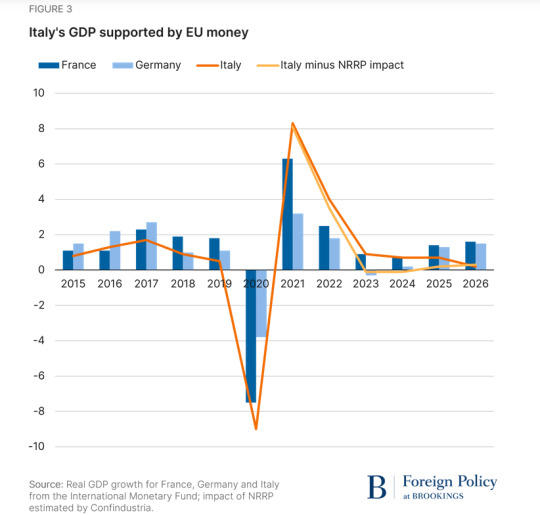
The moment of truth is approaching as a new set of European fiscal regulations, which had been suspended following the COVID-19 pandemic and recession in 2020), will affect the upcoming EU budget legislation in September 2024. Each EU member state must commit to putting its public finances on a sound footing or face sanctions and exclusion from the European Central Bank’s umbrella protecting the euro area.
The benefits of the European funds will be especially felt between 2023-2025. Italy’s economic growth could thus be higher than 1% in 2024 and 2025, exceeding the eurozone average, with strong benefits for the country’s public accounts. Buoyant tax revenues are already reducing the risk of a fiscal correction and granting breathing space to the government.
In fact, the end of 2024 and 2025 may provide more positive economic surprises. This period thus represents the most favorable window of opportunity to reform the Italian economy. However, the government is not working on modernizing the economy. Unlike other right-wing governments, Italy has no significant program in store for market liberalization, tax cuts, or red-tape reduction beyond what is required by the European Commission. Meloni does not seem to consider this a priority, focused as she is on keeping public support for her government as strong as possible.
However, things might change after 2025 when maintaining fiscal discipline will require either lower expenditures or higher taxes, which could force Meloni to break some key electoral promises.
Faced with economic constraints, populist politicians have a penchant for blaming Europe. But that may not work this time: the new EU fiscal rules are designed to prevent national governments from accusing Europe of imposing unwanted measures. Under the new reform, the fiscal strategies to decrease the national debts over four or seven years are developed together by the European Commission and the relevant national government, leaving no room to scapegoat Brussels. The preliminary agreement with the European Commission increases the national government’s responsibility for the prescribed reforms and fiscal measures.
3. Meloni’s unraveling European plans
The June 6-9 European elections were central to Meloni’s plan to obtain more fiscal leeway from the European Commission because polls were showing that the Italian prime minister could obtain significant success, especially compared to her French and German colleagues. Meloni was calculating that her improved stature would give her leverage to negotiate for leniency with the new European Commission. She even postponed updating Italy’s budget plan (required by EU and national regulations) from April to September to gain a better understanding of how the elections would change Europe’s political dynamics. On June 10, Meloni emerged as a clear winner in the European vote, while French President Emmanuel Macron and German Chancellor Olaf Scholz suffered defeats. Nonetheless, subsequent events did not unfold as she hoped.
While Meloni was heralded at home and by the international press as a new leader of Europe, she was sidelined by her peers both during the G7 summit she hosted in Apulia and in Brussels during negotiations to decide the future heads of the European institutions. Despite media acclaim for the G7’s apparent success in Apulia, the meeting turned out to be a personal setback for Meloni: Macron criticized her for deleting or downplaying references to abortion and LGBTQ+ rights in the final communiqué and singled out Meloni as a leader not aligned with the other liberal democrats. According to an article by The New York Times, “When told of Ms. Meloni’s position, American officials say, President Biden pushed back, wanting an explicit reference to reproductive rights and at least a reaffirmation of support for abortion rights from last year’s communiqué. Several other G7 members agreed with Mr. Biden.”
First in Apulia and later in Brussels, Macron and Scholz, along with the heads of the main pro-European party groups in the European Parliament (the European People’s Party, the Progressive Alliance of Socialists and Democrats, and Renew Europe), exploited the incident to sideline Meloni during discussions about renovating EU institutions. A surprised and outraged Meloni threatened to retaliate after the French elections on July 7. In the French National Assembly vote, Marine Le Pen’s far-right National Rally was expected to win the most seats, possibly resulting in a considerable loss of credibility for Macron.
However, the possibility of Le Pen’s party winning in France unsettled financial investors, driving up the cost of refinancing Italian debt—a metric (“lo spread”) long treated as a bellwether of Italy’s financial and political stability. Long-term interest rates increased in France, but also significantly in Italy. Even the euro exchange rate weakened, reflecting growing uncertainty about the future of European integration with the rise of nationalist forces.
What happened between the two rounds of the French elections showed that for the sake of Italy’s economic health, Meloni should have hoped that her fellow EU leaders would reinforce the process of European integration. She should have pursued a constructive dialogue with the pro-European leaders, including Macron and Scholz. A more stable European framework could strengthen Italy’s economic and political stability. On the contrary, in a financially challenged environment, even self-governance and individual liberties can suffer. Looking forward to an anti-European French prime minister or U.S. president is a clear indication that Meloni did not appear to have grasped how Italy’s economic and political stability depend on its active cooperation within the EU and international alliances. In this regard, she still acted more as an ideologue than a stateswoman.
This contradiction needs to be analyzed. Meloni frequently asserts that other European leaders should defer to her because she is the leader of “a great nation,” or because she heads “the most stable government in Europe.” The argument that Italy, as one of the largest countries in the EU, should receive special consideration in appointments or common decisions is based on a view that EU membership positions should be assigned according to the size of each country’s financial or operational contributions, regardless of its political inclination or regime.6 However, the European Union is not just an international organization; it is a supranational institution whose member states and citizens share a common set of legally binding norms and a decisionmaking process that does not require unanimity. States and their citizens will sometimes be in a minority, and others’ positions—the majority—will prevail. For this supranational democratic principle to work, it has to be shared and respected everywhere across the European space, on the understanding that the sacrifices and benefits will over time be reciprocal.
By emphasizing the primacy of national interests over European majorities, Meloni (and her advisers, who are rooted in nationalist ideology) undermine or even actively work against a foundational principle of the European Union. With nearly one-third of the members of the European Parliament now representing euro-skeptic positions, the risk to Europe’s political coherence and ability to act is very real. Consequently, pro-European leaders tend to sideline Meloni, like other euro-skeptic leaders, in their collaborative decisionmaking process.
Meloni’s sovereignism is not about leaving the EU (especially after Brexit’s failure), but about rebuilding the Europe of nations—transforming the supranational institution into an organization between states and resisting any further integration or broader application of majority voting. This is the reason why conservative euro-skeptics or outright nationalists cannot easily be included in decisionmaking processes about putting together the next European Commission or setting EU policy.
Meloni’s strategy backfires
Since becoming prime minister, Meloni was expected to complete a transition from the leader of a far-right party to that of a traditional conservative one. Her idea was to remain in an intermediate position as a pivot between the European establishment and the surging nationalist parties. Meloni played a critical role as president of the European Conservatives and Reformists (ECR) parliamentary group, a political formation that maintains that “The European Union has overreached … [and] become too centralized, too ambitious, and too out of touch with ordinary citizens.” It envisions “a reformed European Union as a community of nations cooperating in shared confederal institutions in areas where they have some common interests that can best be advanced by working together.”
There was no ambiguity about the fact that Meloni had been chosen to lead an anti-European alliance. Meloni’s main ally in the ECR group is Poland’s Law and Justice Party, which governed Poland from 2015 until December 2023 before being ousted by a pro-European coalition. (Britain’s Conservatives were part of the group for the decade before Brexit.) During its time in power, Law and Justice changed the Polish Supreme Court’s role and composition, eliminated constitutional checks, reduced the independence of public administration, restricted independent media, and curtailed freedom of speech and assembly. As a result, in 2017, the European Union initiated legal proceedings against Poland (as well as Hungary) for violating its fundamental principles. The procedure was then closed in 2024 when a new government was elected.
The new Polish coalition government is held together by its pro-European stance and opposition to Law and Justice. Prime Minister Donald Tusk served in Brussels as president of the European Council from 2014 to 2019 and also served as president of the European People’s Party (EPP) from 2019 to 2022. Tusk is now the leader of the largest European country whose government is led by a member of the center-right EPP, the largest political force in the European Parliament, making him an important voice both in the council and the parliament. Through the ECR, Meloni found herself opposing the EPP, indispensable to her strategy of becoming the bridge between the center and the right in Europe. The ECR aimed to become the third-largest political group in the European Parliament and to offer an alternative to the EPP, replacing the traditional left-leaning allies.
After the French elections, many far-right parties joined under a new formation, “Patriots for Europe,” which is larger than the ECR.7 Meloni’s strategy to become an indispensable interlocutor for a political shift to the right was frustrated as ECR came out of the elections as only the fourth-largest group in the European Parliament, just a whisker ahead of centrist-liberal Renew Europe.
Meloni also failed because she misunderstood two facts: first, for reasons that were explained earlier, pro-European formations, however politically heterogeneous they may be, tend to coalesce in “constitutional alliances” because they view their antagonists as anti-European and a threat to democracy; second, due to their very nature, nationalists intrinsically struggle to form alliances across nations.
Meloni’s waning influence became apparent when the pro-European leaders convened, informally in Apulia and then formally in Brussels, to select candidates for top positions within the EU. Von der Leyen was chosen for a new mandate as president of the European Commission, former Portuguese Prime Minister António Costa as president of the European Council, and Estonian leader Kaja Kallas as head of the EU’s foreign policy service. Meloni was not consulted, and she responded angrily. During the European Council vote, Meloni voted against Costa and Kallas and abstained from voting for von der Leyen, while everyone else, except for Hungary’s Orbán, endorsed her nomination. This marked the first instance of an Italian prime minister not voting for the proposed European Commission presidential candidate. When the European Parliament confirmed the appointments, Meloni’s party, alongside Hungary’s Fidesz and France’s National Rally, voted against von der Leyen. Once more, Meloni’s anger stemmed from her ideological opposition to pro-European politicians, but her actions ultimately isolated Italy from Europe’s other decisionmakers.
Conclusion
Meloni capitalized on the resurgence of nationalist sentiments in Italy and Europe by turning a small party into Italy’s primary political force and a leading conservative anti-European party in the EU. She later surprised international observers by adopting a more moderate posture, though without clearly breaking with her past or becoming a mainstream conservative leader. Yet her lack of international legitimacy and the pressing constraints on Italian public finance pushed her in that direction; she was compelled to adapt to similar rules and behaviors as other European governments and further align with American or trans-Atlantic policies. It is possible that she embraced an enthusiastic pro-American stance also as a way to distance herself from European politics and priorities.
Domestically, during her first 20 months in office, Meloni has not once presented new ideas for social change or economic renewal. After a brilliant presentation of her government’s program in October 2022, her rhetorical toolbox has often returned to the same topics as when she was an opposition leader. As mentioned, Meloni’s political experience in Italy has always been rooted more in her opposition to the left, rather than in specific cultural contents or social and economic models. In this sense, Meloni’s personal political history is also central to her problems in Europe, where her options are limited because she cannot even consider allying with the social democrats in a large European coalition. To gain power in Europe, she would need to persuade the centrist EPP to no longer be centrists—that is, to form a right-wing alliance in a bipolar political structure, which, by definition, excludes the existence of a center. But moving the EPP from its traditional centrist positioning is a long shot. It could become even more difficult after September 2025 if the center-right Christian Democratic Union (CDU), currently leading in the polls, wins Germany’s federal elections and forms an alignment of CDU centrist leaders in Brussels (von der Leyen) and Berlin (CDU leader Friedrich Merz or an alternative chancellor candidate).
As a talented politician, in recent years, Meloni has felt the wind of consensus for sovereignism blowing behind her, and she has translated it dialectically into the wind of history, or a call from the people.
After Meloni was excluded from the negotiations to select European institutions’ next leaders, her party colleagues hope that the spirit of the times can again become irresistible if the United States also chooses a sovereignist and anti-European president. Asked to describe his preferred outcome for the U.S. presidential election, Nicola Procaccini, who co-leads Meloni’s faction in the European Parliament, said: “We hope that Trump will win.”
Even if a Republican president wins the U.S. election in November, however, Meloni is currently isolated in the EU and unable to leverage her political affinity with former President Donald Trump. On the contrary, she might be confronted with a slew of ambiguities, including her whole-heartedly rhetorical endorsement of militarily defending Ukraine, which was primarily grounded in her need for trans-Atlantic legitimacy. If Trump wins the U.S. presidency, Meloni might be tempted to “coherently” change course in order to align with a United States that is less supportive of Kyiv.
However, siding with Trump may cause other problems. Italy’s economy is Europe’s second industrial exporting power after Germany, and U.S. protectionism might hurt it more than other countries. Even at the domestic level, Europe’s confrontation with a new U.S. administration may wrong-foot Meloni’s government coalition, which must keep together the Lega, whose leader, Matteo Salvini, is a staunch Trump supporter, and Forza Italia, which is part of the same European party as European Commission President von der Leyen.
Meloni’s plans to become the centerpiece of Atlantic conservatism have not worked out so far. She has made several mistakes and risks making more if Italy’s economic situation worsens.
Up to this point, Meloni has prioritized managing consensus over governing the economy and building alliances in Europe. She may need to reconsider her priorities and exactly reverse them: starting with a more constructive European stance, following up with a pro-market approach to economic reforms, and eventually reaping political support. Much depends on the tough choice she is faced with: whether to become Giorgia Mercher—an Italian combination of pro-European Angela Merkel and liberal-conservative Margaret Thatcher—or to slide back to her nationalist convictions.
10 notes
·
View notes
Note
probably have said this to someone before but the whole thing about conversion to Judaism being pretty much literally "adopted into the family" just gets me RIGHT in the heart, like, "you were with us at Sinai", I have joyful tears <3
(have never myself been strongly inclined to convert but there's a lot about the Jewish people and Jewish tradition/history/practice I find both fascinating and totally wonderful)
YEAH IT HITS ME SO HARD
i will say one (beautiful, amazing) thing about my community is i was integrated into everything socially basically from day one, but everything i read about conversion said like "oh your life will be so different after you convert bc you'll officially be One Of The Guys," so that was never really my experience. i already had a bajillion new family members, so the conversion was more "now i get to put on a tallis and lay tefillin and i can finally feel comfortable saying amen when we thank gd for making us jews during psukei dezimra and i'm officially a member of the synagogue" and all that
i was able to do my mikveh ritual the monday before shavuos this year, and my first aliyah was on shavuos day during the morning reading. it was so meaningful to me that i was able to observe shavuos and say definitively that i was there on mt sinai. it's something i'll cherish for the rest of my life and i'm so happy i get to be jewish :)
i read a very quick book recently on interfaith families called "a place in the tent" (free on the internet archive btw) which proposed the term "k'rov yisrael" to refer to those who are not jewish in our lives, and yet still participate heavily in jewish life. i think it's so lovely that conservative judaism is starting to make a more intentional effort to bring them in
10 notes
·
View notes
Text
Don Moynihan at Can We Still Govern?:
At the Democratic National Convention, speaker after speaker sought to remind viewers of Project 2025. Jim Clyburn referred to it as “Jim Crow 2.0.” Cory Booker mocked it was “Project 1825” and “Project 1925.” Michigan Senator Mallory McMorrow was one of many speakers who brought an enlarged version of the Mandate for Leadership document published by the Heritage Foundation that serves as the backbone to Project 2025.
Trump’s campaign has falsely claimed that Project 2025 is dead, and in mailers to voters he has doubled down on his efforts to distance himself from it. (Note to Forbes and other media outlets who confuse repeating Trump’s lies with reporting: this is what you get — becoming a tool in his disinformation efforts).
Of course, Project 2025 very much remains alive and the most relevant way to understand how Trump would govern. At the convention, Tim Walz invoked Project 2025 when he said that “when somebody takes the time to draw up a playbook, they’re going to use it.” The comedian Kenan Thompson gave one of best summaries of the relationship between Trump and Project 2025:
[You know how when you download an app and there are hundreds of pages there that you don’t read. Its just the terms and conditions. And you just click agree, right? Well, these are the terms and conditions of a second Trump Presidency. You vote for him, you vote for all of this.]
Trump dislikes Project 2025 as a brand because it lays out a series of specifics about right wing policy goals, which, it turns out, are unpopular. There has been some schadenfreude in how Project 2025 has become baggage for the Trump campaign, and has in some ways backfired for the Heritage Foundation, who went from energetically promoting their ties to Trump to gingerly defending their efforts from Trump’s own campaign.
We got a glimpse about the scale and nature of these plans when some British undercover journalists performed a sting operation of Russ Vought. Vought is touted as a potential Chief of Staff in a second Trump administration. As a Trump official, he helped to cover up Trump’s withholding of arms to Ukraine, and aggressively pushed Trump’s plan to fire career civil servants. Out of office, he then complains about the weaponization of federal agencies without a trace of irony.
[...]
The Heritage Foundation been portrayed as the central player in Project 2025, deservedly so. But its role reflects a certain continuity of effort — it has been publishing Mandate for Leadership guides since Reagan — that understates the dramatic nature of the change that has taken place on the right. The Conservative Partnership Institute, which has played a less visible role in Project 2025, is more emblematic of the MAGAification of the conservative movement. A recent profile of CPI by Jonathan Blitzer in the New Yorker is eye-opening.
CPI was created in 2017 by Jim DeMint, the Heritage Foundation leader who was pushed out for trashing Heritage’s reputation for credible research by making it more partisan and less serious. DeMint also aligned early with Trump, which some Heritage board members never forgave him for.
CPI operates less like a think tank, where former Trump officials hang their hat, and more like a venture capital firm providing seed funding for MAGA-aligned organizations, as well as connections to other donors, and physical space to get a foothold in DC. These include:
Russ Vought’s Center for Renewing America
Stephen Miller’s America First Legal
The American Accountability Foundation, which ran attack campaigns against Biden nominees, and is currently compiling an enemies list of career civil servants
Cleta Mitchell’s Election Integrity Network. CPI had been deeply involved in election denial. It helped to organize efforts to disrupt the vote to confirm Biden’s election on January 6th. Mitchell a Secretary of CPI, was the lawyer who helped Trump with his call to Georgia officials asking them to fine more votes. She is organizing a network of legal challenges to block legitimate election outcomes this year.
The State Freedom Caucus Network, whose goal is to embed state versions of the House Freedom Caucus in every state
An API official said that in a speech at Mar-A-Lago: “Trump complained about his personnel. He said he had these bad generals, bad Cabinet secretaries. That was a big signal to the people there.” This is why there is such an intense focus on Schedule F, to fire civil servants, and building a pipeline of dedicated Trumpists as political appointees.
Part of the function of CPI was to alter the incentives for Trump officials. A previous generation of conservative lawyers or other appointees might worry about their long-term career prospects for engaging in a little light treason. CPI has created an ecosystem existed to defend them (they have funded legal defenses for John Eastman, Peter Navarro, Mark Meadows and Jeffery Clark), to and to find them new roles after wrongdoing.
@Don Moynihan nails it: The “next phase” of Project 2025 contains plans we don’t even know about.
#Project 2025#2024 DNC#Don Moynihan#Donald Trump#Kenan Thompson#Malcolm Kenyatta#Jim Clyburn#Tim Walz#Russ Vought#State Freedom Caucus Network#Conservative Partnership Institute#The Heritage Foundation#Election Integrity Network#American Accountability Foundation#Center For Renewing America#America First Legal
8 notes
·
View notes
Text
The Alito Scandal Is Worse Than It Seems

Over the last two weeks, The New York Times revealed that two political flags were flown at Justice Samuel Alito’s homes — an upside-down American flag in the days after Jan. 6, 2021, and an “Appeal to Heaven” flag in the summer of 2023. | Olivier Douliery/AFP/Getty Images
By Ankush Khardori
05/30/2024 10:00 AM EDT
Ankush Khardori is a senior writer for POLITICO Magazine and a former federal prosecutor at the Department of Justice, where he specialized in financial fraud and white-collar crime. He has also worked in the private sector on complex commercial litigation and white-collar corporate defense. His column, Rules of Law, offers an unvarnished look at national legal affairs and the political dimensions of the law at a moment when the two are inextricably linked.
Supreme Court Justice Samuel Alito has been infuriating his critics for years. He has gone on undisclosed luxury vacations with conservative donors who have business before the court. He appears to have leaked the result of a major case to conservative activists before the decision was announced. And that doesn’t even get into his jurisprudence, including the opinion that threw out Roe v. Wade.
But the revelations over the last two weeks from The New York Times concerning the political flags flown at Alito’s homes — an upside-down American flag in the days after Jan. 6, 2021, and an “Appeal to Heaven” flag in the summer of 2023 — have pushed Alito’s behavior into an entirely different realm, one that raises serious questions about Alito’s partisanship, his ethics and the integrity of the court.
The upside-down American flag has historically been used as a sign of distress by the U.S. military but became a symbol of support for Donald Trump’s “Stop the Steal” movement following the 2020 election, and the Appeal to Heaven flag has been used by Christian nationalists. Both were flown by Jan. 6 rioters.
The Alito household’s display of those flags — no matter what prompted it or whose decision it was to fly them — means that Alito should recuse himself from the cases pending before the court concerning Trump’s alleged efforts to steal the election. His stated refusal to do so in a letter to senior Democrats Wednesday runs afoul of the most basic judicial ethical norms: Judges are not supposed to signal their views on matters that are likely to come before the court.
But this whole episode also shows the fecklessness of Democrats, who seem to be reluctant to try to hold the court to account — which may have only encouraged the conservative justices to feel like they have free rein to flout judicial norms. President Joe Biden, in particular, has been far too reluctant to challenge the court, both with his early, toothless effort to float court reforms and now amid a series of clear ethical breaches by the justices.
There are a few problems with Alito’s behavior.
For one, Alito may have intentionally tried to mislead the public about what happened and to position himself and his wife as the victims. Alito told Fox News that his wife hoisted the first flag after a neighbor had put up a sign blaming her for the Jan. 6 riot and had used derogatory language toward her, “including the C-word.” But the Times’ latest story reports that verbal altercation took place weeks after the flag had flown and come down.
Even if Alito’s account is completely true, though, there would still be no excuse for a Supreme Court justice to allow such a partisan symbol to fly outside of their home, especially one whose message overlaps with a pending case.
In the letter that Alito sent to lawmakers explaining his decision not to recuse himself from cases related to the 2020 election, Alito claimed that he “had nothing whatsoever to do with the flying of [the upside-down] flag.” He also said that his wife “has the legal right to use the property as she sees fit”; that she also flew the Appeal to Heaven flag but that neither of them was “aware of any connection” to Trump’s “Stop the Steal” movement; and that no one could reasonably question his impartiality unless they were motivated by “political or ideological considerations or a desire to affect the outcome of Supreme Court cases.”
His wife might have been the one who raised it, but given that it flew outside a house he lives in, it is entirely reasonable to assume that Alito explicitly or tacitly endorsed the message of the flag. As one sitting federal judge put it, “Any judge with reasonable ethical instincts would have realized immediately that flying the flag then and in that way was improper. And dumb.”
Alito himself has acknowledged the danger of overtly signaling political views. Here is what he said in his confirmation hearing when he was dodging questions about what he thought about Roe v. Wade or whether it was considered settled law: “It would be wrong for me to say to anybody who might be bringing any case before my court, ‘If you bring your case before my court, I’m not even going to listen to you. I’ve made up my mind on this issue.
The proposition that justices should not express opinions on issues that may come before them provides a basis for his recusal, but so does another basic and closely related principle that you can also find in the ethics code issued by the Supreme Court late last year, after a flurry of controversies involving Alito and Justice Clarence Thomas. The code provides that a justice “should disqualify himself or herself in a proceeding in which the Justice’s impartiality might reasonably be questioned, that is, where an unbiased and reasonable person who is aware of all relevant circumstances would doubt that the Justice could fairly discharge his or her duties.
That standard is met here too.
Many conservatives have rushed to Alito’s defense. After the first Times story, one Republican lawyer quickly derided the reporting and mounted a classic “they did it too” defense, pointing to liberal judges whose spouses engaged in activism related to cases before them. But none of them did anything remotely like what Alito’s wife did. Alito’s defenders have pointed to remarks that former Justice Ruth Bader Ginsburg made about Trump — that he was a “faker” and would be bad for the country. They may be right that those comments were unwise and perhaps even improper, but she has long since passed away, so it is a debater’s point at best.
Meanwhile, the leaders of the Democratic Party are struggling to figure out how to react.
Senate Judiciary Committee Chair Dick Durbin has refused calls to bring Alito and Chief Justice John Roberts in for a formal hearing on the issue. Instead, he and Sen. Sheldon Whitehouse, another senior Democrat on the panel, merely asked Roberts to push Alito to recuse himself on cases related to the 2020 election and to come in for a meeting. According to White House aides, President Joe Biden is reluctant to engage on the controversy because he fears that criticizing the conservative justices will undermine the court’s legitimacy as well as the president’s claim to be a supporter of the country’s democratic institutions and norms.
The latest Alito scandal has crystallized some of the most disturbing dynamics surrounding the court.
First, Alito’s conduct, including his potentially dishonest public defense, demonstrates the contempt that he has for his critics and for people outside of his political tribe — which appears to be far-right religious conservatives and Trump supporters. Supreme Court justices have long been reluctant to engage in full transparency, but at a time of growing public skepticism toward the court, he owes the country far more detailed — and far more substantive — answers to the serious questions that have been raised about his conduct and the backstory to the raising of both flags at his homes, including the evolution of his accounts in the media.
Second, the concept of recusal at the court appears to be dead, at least for the conservative justices; some liberal justices still do. Clarence Thomas should already have recused himself from the 2020 election cases but hasn’t. Alito should do the same but won’t. Such a decision could ultimately tip the balance in Trump’s immunity case.
Third, the court’s relatively new ethics rules — which were self-imposed and are unenforceable — are basically a sham. Alito and Thomas in particular appear to think that they can do whatever they want, and they appear to be right that Roberts will do nothing unless he is somehow forced to change course by virtue of political circumstances and public pressure. In the meantime, Roberts has tried to convince the public into thinking that the court is attending to its ethical problems, when it clearly is not.
Finally, and just as importantly, the Democratic Party — and Biden in particular — has fallen down on the job.
The court is in desperate need of structural reform. But instead of seriously pursuing that effort after his election (be it expanding the court, instituting term limits or anything else), Biden convened a largely pointless commission to study potential reforms. Their work — a ponderous, 300-page report issued in late 2021 — was barely read and promptly forgotten, perhaps by design.
There are reasonable debates to be had about the political viability of such a reform effort, but the Biden White House has shown through its own actions that they will invest considerable time and political capital into legislative efforts that they believe are worthy of their attention. Just as importantly, even if a court reform initiative had failed, Biden and the White House could have raised the salience of the issue among the general public and begun building the necessary political momentum over time. (That, after all, is precisely what conservatives did in order to secure their supermajority on the court.)
That might have positioned Biden to make court reform a real campaign issue in the 2024 presidential campaign, which would have paired well with his drive to reenshrine abortion rights. Instead, he voluntarily ceded the ground, and an about-face on the issue in the run-up to November will likely look politically motivated to many people.
Ironically, Biden’s solicitousness of the Supreme Court could ultimately prove to be the downfall of his own presidency.
He has essentially stood idly by while the court has upended key aspects of American life — from abortion to affirmative action — and angered huge swaths of the country, likely contributing to the widespread national discontent that threatens his reelection. The conservatives also gutted one of Biden’s most significant domestic policy initiatives by striking down his student-loan relief program. And they may be on the cusp of letting Trump escape without a trial on the Justice Department’s 2020 election prosecution before November.
That case is the most politically and legally significant of Trump’s pending criminal cases, including the hush-money prosecution in Manhattan. If Trump were convicted in the federal election subversion case, the result could plausibly swing the election against him — and with good reason: The American public should probably know whether a candidate engaged in an egregious and unprecedented criminal conspiracy to steal the last presidential election.
Instead, Biden finds his political fortunes beholden to a court that he has failed to control and that, in the end, could doom his own presidency.
11 notes
·
View notes
Text
WHY the media is focused on Biden's Debate Performance
There we are, that's why the media is centering so much on the Biden 1st debate performance to the exclusion of so much else:
With calls to replace Biden growing within the Democratic Party, and leading members openly discussing the prospect, the fact that the Heritage Foundation, arguably the GOP’s ideological engine, has already been preparing to thwart any such plans is worrying. According to the memo, the key states of Wisconsin, Nevada, and Georgia are where legal action to keep Biden on the ballot could pay off.
Something smells very off about this timing.
The Heritage Foundation’s Oversight Project began researching the laws for replacing a president in several battleground states about four months ago, putting together a report in April and releasing it before Thursday’s debate disaster, according to NOTUS.
4 months before the debate. And the head of the Oversight Project is the same guy who started Project 2025. Issuing a memo on the report 6 days before the debate.

From the memo:
Three of the expected six most contested states have some potential for pre-election litigation aimed at exasperating, with legitimate concerns for election integrity, the withdrawal process for a presidential candidate.
[...]
Important caveats include the timeline and triggering events. For example, some states allow withdrawal before the 74th day before an election,[12]and failure to adhere to these timelines can result in the candidate’s name remaining on the ballot[13](which provides its own corollary of post-election litigation).
[...]
There is also the possibility that states will be complicit in an improper withdrawal or substitution.
[...]
Much will come down to when Biden withdraws, what procedures he does or does not follow, and the operating state law timelines and triggering events. However, at least 31 states defer to state or national party rules and committees for nominating in the event of withdrawal.[16] These states circumvent the substitution process highlighted above. There may be some avenues for challenges to these laws on improper delegation grounds, however, these may be marginally beneficial.
There is also the issue of applicability. In some of these states there are no statutes that deal with presidential candidate withdrawal or vacancy in nominations, or the laws only operate at the primary election. Even more, there is little caselaw determining when these statutes apply. Some of the extant cases do address applying these withdrawal statutes to different fact patterns than those contemplated by the statutory text, such as withdrawal of independent presidential candidates[17]or congressional candidates.[18] Yet, this confusion may be its own source of litigation.
In other words: get Biden off the ballot, and there is legal precedent in some places to prevent his replacement, and locking Biden on it. Meaning the vote is effectively nullified, it legally won't count even if it is marked correctly. And in many more states the law is unclear meaning it can be pushed out of the election system, where Republican voters are outnumbered by non-Republican voters, and into the court system that has been staffed, bought, and paid for by MAGA supporters such as, for example: Federalist society member U.S. District Judge Aileen Cannon (appointed by Trump in), Associate Supreme Court Justice Clarence Thomas (who has accepted at least 4 million in bribes that we know of), and (real estate magnate and Republican megadonor) Harlan Crow (Who has been bribing Justice Thomas for years).
According to Rolling stone:
A senior source involved with Donald Trump’s 2024 effort to win the presidency and another person working with the Heritage-based Project 2025 (the conservative policy agenda project) tell Rolling Stone that the point of these legal attack plans and potential blitz of challenges isn’t necessarily to win.
A key point, the sources say, would be to weigh down the Democratic nominee, the national party, and their legal and political allies in as many unique court battles and sideshows as possible — so that the Democratic Party would have to waste resources and time on those matters when liberals would want to be laser-focused on, say, the battleground states that will likely decide whether Trump returns to power.
Team Biden — or Team whoever — is going to be getting hit on all sides between now and Election Day,” the first source says. “Every legal and political weapon is on the table.” Still, the sources add, they do generally feel more confident in their legal theories than in the past, since Trump stacked the judiciary with right-wing jurists.
Rolling Stone spoke Wednesday night with Mike Howell, a former Trump Homeland Security Department official who is now executive director at the Heritage Foundation’s Oversight Project, which is spearheading the effort to prevent Democrats from replacing Biden.
“President Biden today said he is the nominee, and I think the media has missed the importance of such a statement … If he, in those statements, is legally arguing that he is the nominee, I think that should be read as him circumventing the formal convention process,” he argued. “And Biden’s doing so has tremendous legal implications and statutory impact for states that specifically point to the DNC for who shows up on the ballot as the party’s nominee.”
So, damned either way. Ideally, it sounds like, there will be a failed attempt to replace Biden so it can be tried in the court both ways. And in both the literal courts and the court of public opinion, which is why Trump is having a go at George Clooney.
I swear, at this point, I'm half waiting for the furry hackers that hit Howell to reveal he blackmailed someone on Biden's staff to spike his cold medicine. I know that isn't what happened. It's simply being ready. Still: damned convenient.
9 notes
·
View notes
Text
The Daily Wire, which regularly portrays itself as a defender of women's sports to demonize trans athletes, cries about people calling for Caitlin Clark's salary to be raised

Also, Ben is probably one of the last people to be complaining about anything coming even remotely close to exerting yourself physically (source: Daily Wire on YouTube)
The Daily Wire's whole stance on women's sports twists in the wind depending on what's most convenient for the narrative at that exact moment. Apparently, despite caring about women's sports enough to make a whole transphobic comedy film about it, the Daily Wire is also content with mocking women's basketball and even saying that it shouldn't exist anymore when it suits the narrative that they are trying to paint around the recent controversy about Caitlin Clark's salary. If anything, this response really exposes their "we care about the integrity of women's sports" grift and shows that the Daily Wire and the conservative media ecosystem only really care when they can use it to attack trans athletes. Lets get into it.
Ben Shapiro:
First of all, in an utterly brilliant stroke of journalistic genius Ben spelt Caitlin's name wrong in the title of his video.

There are few more basic facts than somebodies name so this is a pretty disappointing performance from the man of FACTS and LOGIC.
00:00, Ben Shapiro: "Well folks, apparently we're all supposed to be really really disturbed by Caitlin Clark's new WNBA salary."
So, this controversy arises from the fact that the WNBA's top draft pick Caitlin Clark's salary is $338,056. She will earn 76,535 for her first year, $78,066 for her second year and $85,873 her third year. For contrast, the top NBA draft picks salary is $55 million. This is obviously a massive difference and just another example of the gender pay gap at work.
Do I think that someone like Caitlin Clark is the most horrible example of the gender pay gap in action? No, there are women who obviously have it way worse. But this still merits conversation if only because it shines a spotlight on the ever present gender pay gap in the United States.
On average, women earn 16% less than men. In some industries, the gender pay gap is staggering. For example, in the legal industry men earn 59% more than women do. Even in the industry with the smallest gender pay gap, Life, physical, and social science occupations, men still earn 9% more than their female counterparts. To deny that there is a gender pay gap is to deny reality.
00:12, Ben Shapiro: "The highly awaited, much watched WNBA draft, apparently it actually did get some decent ratings but only because of Caitlin Clark."
What kind of dumbass argument is that?
"Yeah, I'm gonna be sarcastic about nobody watching the WNBA....except I guess people did watch it...but ONLY because of the person who I'm arguing should get a lower salary."
Newsflash Ben, if people are only watching the WNBA for Caitlin Clark that means that she's singlehandedly bringing large amounts of revenue into the company and thus deserves a higher salary. Ben, in his effort to be pithy, accidentally destroyed his own argument with FACTS and LOGIC.
00:29, Ben Shapiro: "So first of all, I'm gonna use the left-wing argument that they're constantly using with regard to entertainers who make a lot of money which is 'But a public school teacher is only making like, 45 grand so why is Caitlin Clark more important that-'. Again, all those arguments go out the window when it's somebody that they supposedly like."
I've never heard that argument made in my life. My guess is that Ben heard someone on Twitter say that about some billionaire CEO and is now projecting that onto the entire left.
Also also, how does this even relate to anything? This discourse is about Clark's salary in comparison to her male counterparts.
00:45, Ben Shapiro: "In any case, Caitlin Clark making 76 grand and Hoda is very disturbed, super -- not disturbed enough to, you know, cut into her multimillion salary for Caitlin Clark but disturbed."
What does Ben want Hoda Kotb to do? Make a donation?! Again, the discourse isn't around Caitlin being so underpaid that she's going to starve away and die. It's about the difference between her salary and her male counterparts.
Ben plays a clip of Hoda Kotb and then comes back.
01:37, Ben Shapiro: "When women are complaining about the salaries in the WNBA, as comedian Bill Burr has pointed out, women are half the population. They can go to WNBA games, but they don't. So why are you yelling at men about the salaries in the WNBA?"
This is great because I did a one second google search for WNBA and this headline was the first result - "WNBA Draft Reaches Largest Audience Ever, Up 374% Among Women". Hmmm, it seems like women ARE watching WNBA games since WNBA viewership is at a record high especially amongst women.
Ben decides to talk about viewership, says the viewership numbers are bad even though the WNBA has had record viewership this year, and then says something hilariously stupid.
02:12, Ben Shapiro: "Now, maybe that changes because Caitlin Clark is in the WNBA although I have doubts because we've seen this story before. Every time the Women's National Soccer Team wins a championship, wins a world cup, everybody's like 'this is the moment when women's soccer in the United States is just gonna take off on a professional level' and two years later the league is bankrupt because no one went to see a women's soccer game because why would you? A bunch of high school boys could beat them."
Ok Ben, if you're so confident I propose that you and Matt Walsh and Michael Knowles go up against three professional women's soccer players. You guys can bring Tim Pool if you can convince him to leave his compound and experience direct sunlight coupled with the possibility of experiencing the touch of a woman for more than twelve seconds. By Ben's logic him and his Daily Wire cronies would absolutely mop the floor with them. Naturally I think they'd get absolutely demolished but I would love to see that.
You know, for a guy who becomes a staunch defender of women's sports every time a trans athlete competes in them, Ben really doesn't seem to care about women's sports that much. Huh, it's almost as if his concerns about the integrity of women's sports aren't all that sincere.
Matt Walsh:

Lets look at another one of these heroic defenders of women's sports. Matt Walsh, a guy who's based a good quarter of his entire career around whining about trans people in women's sports, surely would be supportive of the WNBA.....right?
04:45, Matt Walsh: "In fact, WNBA players are not underpaid at all. They are, if anything, vastly overpaid. By all rights, as a simple economic matter, WNBA players should not be getting paid anything. If they're getting paid anything above zero, they are overpaid."
Oh. Hmmm, maybe he isn't being sincere when he talks about trans athletes in women's sports either.
"Yeah, I don't want trans people in women's sports....I also think women's sports shouldn't exist but IF they continue to exist I don't want no trans people in there."
Conclusion:
This is another one of those "bedrock" episodes that's pretty valuable for dissecting a conservative media narrative - that narrative being that the right cares about women's sports and is trying to defend it from those evil trans people who....went through years of hormone therapy and oftentimes surgery for the soul purpose of cheating at women's sports I guess?
When you've got guys like Ben Shapiro and Matt Walsh attacking the very notion of having a women's basketball league, maybe they honestly just don't give a crap and are just using this as an excuse to attack trans athletes. It's just pure in your face hypocrisy.
Cheers and I'll see you in the next one.
Sources:
Original Videos:
“WNBA Players Are Actually Being OVERpaid.” Www.youtube.com.
“Caitlyn Clark Does NOT Need a Bigger Salary.” Www.youtube.com.
Gender Pay Gap:
Haan, Kathy. “52 Gender Pay Gap Statistics in 2023 – Forbes Advisor.” Www.forbes.com, 27 Feb. 2023.
Caitlin Clark:
Lenthang, Marlene. “Gap between Caitlin Clark’s WNBA Salary and Her Male Counterparts Draws Outrage.” NBC News, 16 Apr. 2024.
#right wing bullshit#conservative bullshit#journalism#fact checking#bad takes#conservatives#disinformation#politics#debunking#daily wire#matt walsh#ben shapiro#wnba#caitlin clark#trans rights#fuck transphobes
10 notes
·
View notes
Text
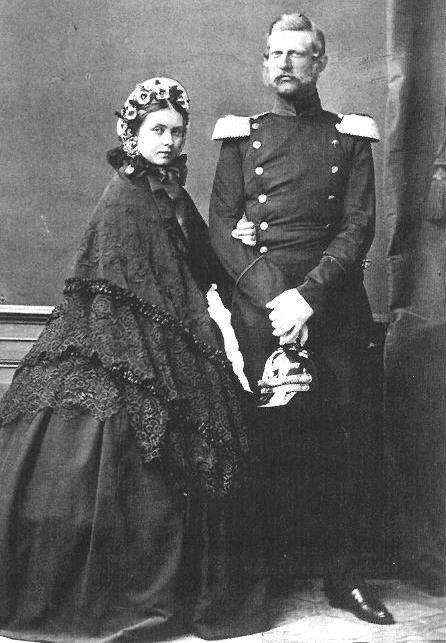
The German Crown Princess and Princess; Frederick and Victoria, The Princess Royal (daughter of Queen Victoria and Prince Albert).
Against their contemporaries of the German Empire, the couple shared liberal views and believed in a constitutional monarchy for Germany. Against the antisemitism of the time, the couple strongly supported the Jewish population of the German Empire regularly visiting synagogues when violence annd and antisemitism against Jewish people was increasing. Especially in the 1880s when a quarter of a million Germans signed a petition demanding Jewish people be banned from public office. Victoria wrote of her disgust of these leaders and her new nation who “behave so hatefully towards people of a different faith and another race who have become an integral part (and by no means the worst) of our nation!" This along with their other liberal beliefs heavily ostracised them from the conservative German court including Frederick’s parents. In contrast her mother, Queen Victoria, was proud of her daughter and son-in-law's efforts to stop the völkisch campaign and wrote to Frederick to say she was happy that her daughter had married a man like him, who was prepared to stand up for the rights of the Jews. Unfortunately for Frederick he would only become Emperor for 99 days due illness. Their son against their knowledge had been educated by a tutor with conservative views which meant their idea of constitutional monarchy would not come to fruition. The majority of their papers were saved having been sent to Windsor Castle before their son could destroy them. As Dowager she was heavily critical of her son who had purged all institutions of people chosen by Victoria and her late husband. When her son, Wilhelm II now the emperor (and last) wrote in the guestbook of the city of Munich the words "Suprema lex regis voluntas" (The will of the king is the supreme law"), she indignantly wrote to her mother; “The Tsar, an infallible Pope, a Bourbon or our poor Charles I might have pronounced that phrase, but a monarch of the 19th century ... My God, I think (...) Fritz's son and the grandson of my dear father took such a direction and also misunderstood the principles with which it is still possible to govern.”
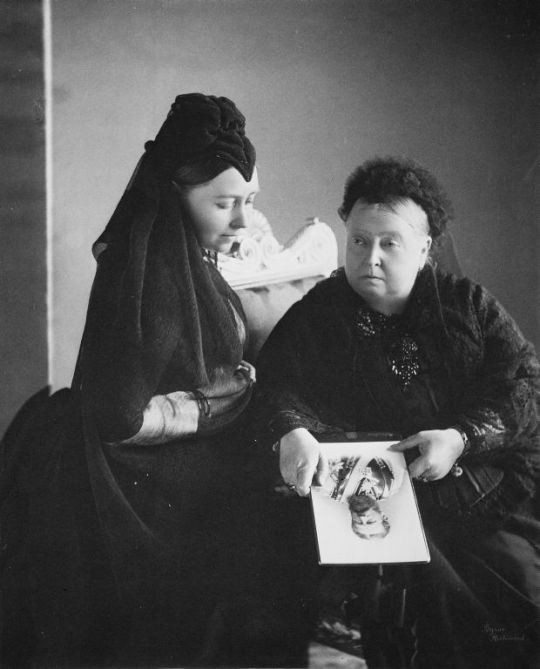
#ktd#british royal family#brf#Victoria princess royal#Queen Victoria#Jewish history#World history#wilhelm ii#frederick iii#Empress of Prussia
18 notes
·
View notes
Text
Good News - April 15-21
(Sorry it's late, I got sick)
Like these weekly compilations? Support me on Ko-fi! Also, if you tip me on here or Ko-fi, at the end of the month I'll send you a link to all of the articles I found but didn't use each week - almost double the content! (I'm new to taking tips on here; if it doesn't show me your username or if you have DM's turned off, please send me a screenshot of your payment)
1. Restoring an unsung hero

“"We are aiming to restore a significant area of seagrass around Nova Scotia, rebuilding these ecosystems and doing it in a climate-smart way," says Derek Tittensor, head of the FOME research group and a professor of biology at Dalhousie. "Importantly, we are also integrating Indigenous and scientific knowledge of these remarkable ecosystems through a two-eyed seeing approach.””
2. Four super-rare quolls caught sneaking around Australian wildlife sanctuary

““We had a mysterious case of cat-trap tampering whereby the traps were closed, the bait was gone but no culprit inside,” explains AWC Field Ecologist, Erin Barritt. [… T]he opportunistic little mischief-makers were juvenile western quolls, the first to be born on the sanctuary in 100 years.”
3. LGBTQ+ parents are raving about ‘accessible’ gender-neutral children’s book What Makes A Baby
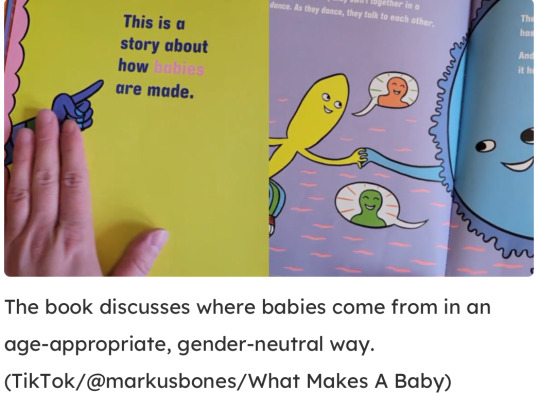
““Overall I think this is a great book and a great representation of what inclusive media can look like. It incorporates a variety of perspectives and experiences to make something that is accessible to everyone.” The LGBTQ+ community – with parents in particular – praised “the accuracy of the terminology”, with one writing: “Human anatomy isn’t too much for children to learn and this book makes it so accessible for them to learn!””
4. Switch to green wastewater infrastructure could reduce emissions and provide huge savings according to new research
“Researchers have shown that a transition to green wastewater-treatment approaches in the U.S. that leverages the potential of carbon-financing could save a staggering $15.6 billion and just under 30 million tons of CO2-equivalent emissions over 40 years.”
5. Millions Offered Up To Create New Disability Employment Models

“[Projects] can focus on increasing access to advanced technology careers, using advanced technology to support youth or adults with disabilities to access competitive integrated employment or helping justice-involved youth with disabilities gain employment. In addition, projects can look at early intervention and workforce reintegration strategies for those with acquired disabilities or efforts to reintegrate disconnected individuals with disabilities into the workforce.”
6. Laser-Treated Cork Absorbs Oil for Carbon-Neutral Ocean Cleanup
“Cork comes from the bark of cork oak trees, which can live for hundreds of years. These trees can be harvested about every seven years, making cork a renewable material. When the bark is removed, the trees amplify their biological activity to replace it and increase their carbon storage, so harvesting cork helps mitigate carbon emissions.”
7. This boat runs on 100% renewables. Can it help clean up bigger ships?

“For the past seven years, Energy Observer has traveled around the world, serving as a floating test bed for zero-emission technologies that can propel boats and ships — without spewing any of the nasty pollution that comes from running diesel engines. […] The project’s leaders say they’re now ready to focus their efforts on cleaning up much larger and dirtier types of vessels, including cargo ships.”
8. 1,000 oceanic manta rays seen in the Maldives
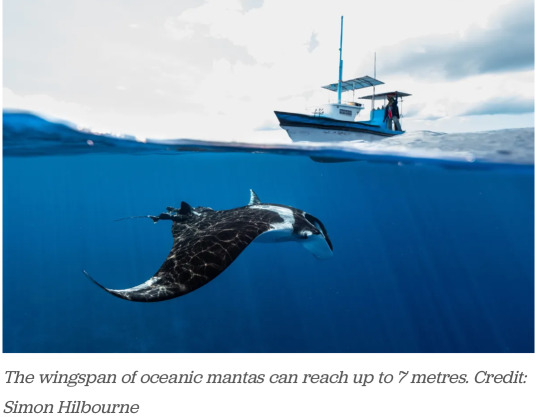
“With 1,000 individuals in its waters, the Maldives is home to the world’s third largest population of giant mantas (it also has the most reef mantas (Mobula alfredi) in the world, with over 5,000 individuals).”
9. Service Finalizes Land Protection Plan for Expanding Muleshoe National Wildlife Refuge

“Plan aims to deliver in-perpetuity conservation of up to 700,000 acres of land for benefit of migratory and resident wildlife. […] "These vast grassland landscapes provide essential habitat for wildlife while also providing benefits like clean water filtration and carbon sequestration, which are essential for both the environment and human well-being."”
10. Medicaid Officials Remove Barriers For Those With Disabilities

“In addition [to grace periods for submitting paperwork], states will no longer be allowed to conduct renewals any more than once every 12 months and they will be barred from requiring in-person interviews for people with disabilities, among other changes.”
And a bonus article to make up for posting late: Gay Furry Hackers strike again!
April 8-14 news here | (all credit for images and written material can be found at the source linked; I don’t claim credit for anything but curating.)
#hopepunk#good news#nature#ocean#climate#climate change#canada#australia#wildlife#lgbtq#lgbtqia#book#disability#employment#rehabilitation#disabled#accessibility#carbon#oil spill#cork#boat#renewableenergy#renewablefuture#solar energy#manta ray#fish and wildlife#birds#habitat#conservation#medicaid
12 notes
·
View notes
Text
What is Taoism?
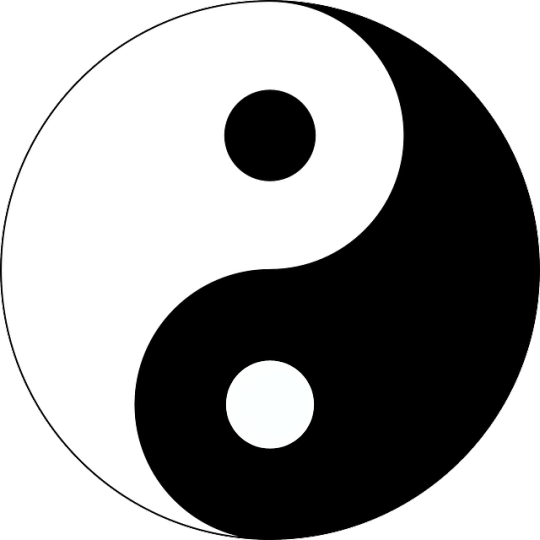
Taoism originated in China between 600 and 500 BC, but the roots of Taoism can be traced back to shamanic practices from the earliest tribal communities. The Chinese word for shaman (wu) was first recorded during the Shang Dynasty (1600-1046 BC), but it is believed that these traditions date back to the very origins of Chinese culture. In fact, many of the stories surrounding Fu Hsi (or Fu Xi), the mythological founder of Chinese civilization are very shamanic. For example, Fu Hsi is considered the originator of the I Ching, an ancient Chinese divination text and the basis of Chinese thought. According to legend, he discovered the symbols of the I Ching in the pattern of markings on the back of a turtle that emerged from a river. This is a classic shamanic tale that combines nature and divination, resulting in the attainment of profound knowledge.
Philosophical Taoism, often represented by the yin-yang symbol, emphasizes living in harmony with the Tao (the Way), or Ultimate Reality, a presence that existed before the universe was formed and which continues to guide the natural world and everything in it. Tao is the ultimate source and way (or process) of nature and the universe. To live in harmony with the Tao is to go with the flow of life rather than against it. It is a way to conserve life's vitality by not expending it in the useless ways of friction and conflict. Early Taoists perceived that the ultimate nature of this mysterious force was beyond intellectual comprehension but could be discerned by the intuitive mind. The sages observed that through meditation, one could attain Tao or communion with the way of the universe itself.
Through meditation and other devotional activities, Taoists seek to bring their lives into accord with the Tao. They believe that by abiding in the Tao, or in harmony with the Cosmos, one may attain a state of such inner clarity and insight that all actions become synchronous and spontaneously correct. They refer to this state of harmony with nature and the universe as wu wei, or "non-doing." Non-doing is not a withdrawal from action, but rather the achievement of a higher kind of action: action in accord with the natural order. The concept of wu wei more closely suggests a way of existing without conscious effort, as nature does. Such a person knows what to do by abiding in a state of quietism, by letting go of all worldly thought so that the creative force of the Tao may enter their minds and bodies. Such accord with the Tao allows one to accomplish things without effort in a way that benefits everyone.
Taoism is an inner way as well as an outward path. One should outwardly "go with the flow" while inwardly adhering to one's true nature. Taoists seek to integrate inner and outer experiences while uniting body, mind and spirit into a harmonious whole. Taoism views humanity as a microcosm of the macrocosm we call the universe. Each human being is a hologram of the Cosmos, a weaving together of universal information from a particular point of view. Essentially, we are the universe experiencing itself in human form.
Taoists equate the body with the earthly realm, the mind with the human realm, and the spirit with the heavenly realm. By bringing the body, mind and spirit into accord, one transforms personal experience and influences the interactions of the three cosmic realms. Following the Tao is a journey requiring simplicity, balance and introspection. The lifelong quest of the Taoist is to identify their innermost purpose in life, and then use every means at their disposal to achieve it.
97 notes
·
View notes